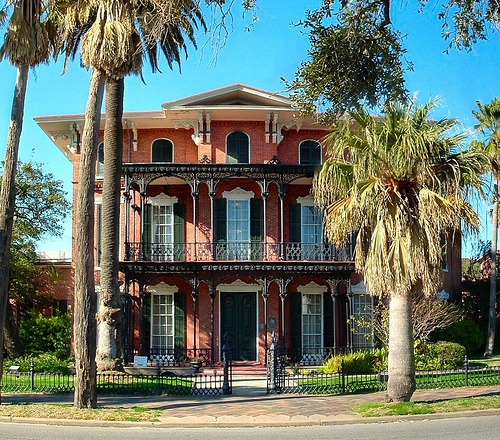
(The photo is of Galveston’s Ashton Villa, where General Granger announced the emancipation of slaves in Texas, on June 19, 1865, and is by N. Saum on Wikimedia.)
Friends, the action by the U.S. Congress and President this week, to make Juneteenth a national holiday, made me think there might be some value in sharing again the journal I wrote last year about this day. So, with very minor edits here is that journal. As an American, I pray the celebration of this day might be part of leading our nation to a more perfect union, with genuine liberty and justice for all. As a follower of Jesus, I pray that the Lord will use such celebrations to open our eyes to new ways to serve as instruments of his shalom, which extends far, far beyond the reach of political efforts.
Near the beginning of the Gospel of Mark, Jesus says the Kingdom of God has come so near that people need to turn away from everything else and embrace it (Mark 1:15). In the middle of the Gospel of Luke, Jesus says that the Kingdom of God was present “in the midst” of those around him (Luke 17:21). At the same time, all of the Gospels portray Jesus referring to the Kingdom of God as a future reality—one that Jesus taught his followers to ask their Heavenly Father to bring (Matthew 6:10, Luke 11:2).
So which is it? Did the reign of God come in Jesus, 2,000 years ago? Or is it yet to come in the future? The answer is… yes!!
The testimony of the New Testament is clear: the hinge point of history has come, the decisive change for humanity (and all creation) has begun. But the end point lies beyond our vision.
We live in-between, in the already-but-not-yet. (As I look at my own life, the basic idea is pretty easy to “get.” After nearly 50 years of consciously seeking to follow Jesus, I know something dramatically new began in my life, back in the fall of 1971. But, with far too much frequency, I see from my thoughts, words and actions that the process of my full transformation in Christ… ain’t over yet!)
We followers of Jesus, then, ought to be especially able to grasp what the commemoration known as Juneteenth is all about. “Juneteenth” connects back to June 19, 1865, when Major General Gordon Granger delivered the news in Galveston, that Texas’ enslaved residents had been set free. It was 70 days after Lee’s surrender to Grant at Appomattox ended the American Civil War. It was two and a half years after Lincoln’s Emancipation Proclamation went into effect (on January 1, 1863) and nearly three years after its announcement (September 22, 1862). June 19, 1865 was the day when emancipation came to the last group of slaves in the Confederacy to gain their freedom. Because the war had been launched and fought in order to keep African Americans enslaved, Juneteenth is a powerful symbol of the victory of freedom over the forces of enslavement. Finally, the word came.
But, actually, Juneteenth stands for a truth that is even messier. For it would be almost 6 more months after Granger’s announcement in Galveston before slavery would be fully abolished in the U.S. It was December 9, 1865 when the 13th Amendment to the U.S. Constitution was ratified. (Surprisingly to many 21st century folks, Lincoln’s proclamation in September of 1862 did not apply to all enslaved people, but only to those in states that had seceded from the U.S. in order to defend slavery. Slavery could still be practiced within the Union until member states abolished it… or until ratification of the 13th Amendment.)
So “the end of slavery in the U.S.” was a messy and complex story. More than that, the reality of undoing everything that was wrapped up in American slavery is even infinitely messier.
That should not surprise us, since the enslavement of fellow human beings had been woven into the fabric of the nation since long before it had become a nation. It involved millions of people over hundreds of years. Even without addressing the enslavement of Native Americans, just the origins of the enslavement of African people in North America are hard to pin down. Wikipedia acknowledges the commonly-accepted date of 1619 (when enslaved Angolans were brought to Jamestown, Virginia, by an Englishman sailing under a Dutch flag). But Wikipedia also notes that two different Spanish explorers/conquistadors had already introduced enslaved Africans to North America much earlier: in Florida (1539) and Georgia (1526).
Whether it started 147 or 250 years before the Declaration of Independence, the enslavement of African people was deeply enmeshed in the life of the new nation by the time it was born. And, though the term “slave,” does not occur in our founding charter, the reality of slavery is clearly embedded in the U.S. Constitution (“the three-fifths compromise”). By the time of the Civil War, the enslavement of African people was even more deeply embedded in the economic and social life of the entire nation, and not just in the South (see Edward E. Baptist, The Half Has Never Been Told: Slavery and the Making of American Capitalism.)
Today, 156 years after that day in Galveston, we as a nation are still very much involved in disentangling and undoing the intricate web of attitudes, values, practices, policies and laws that have their origins in the enslavement of human beings from the 1500s to 1865. The 13th Amendment was not enough. Three more had to be added (the 14th, 15th and 24th). Nor have Constitutional amendments been enough, as Supreme Court interpretations of the Constitution have both frustrated and furthered the process (one thinks especially of Plessy v. Ferguson and Brown v. Board of Education, respectively). Jim Crow laws, the “Lost Cause,” lynchings, redlining, the Civil Rights movement, white flight, mass incarceration, Black Lives Matter, massive protests against inequality before the law… all of these parts of the past and the present (and much more besides) belong to the long, slow, painful process of overcoming what was baked into our reality during our earliest years and has been exacerbated repeatedly along the way. Every advancing reform has generated new strategies to oppose and sustain elements and remnants of what should never have been.
To remember Juneteenth in this larger context, is to remember that the Lord has been at this with us for a very, very long time. There is still very far to go, if we are to become a nation where we see all persons as created equal, and equally deserving of the protections and opportunities provided by a framework of laws. But the same Lord who called ancient Israel to “let justice roll down, like waters, and righteousness like an ever-flowing stream” (Amos 5:24), calls us to recognize all persons as our sisters and brothers, and to “seek not [our] own good, but the good of [our] neighbor” (1 Corinthians 10:24).
Within this nation, you and I belong to the group of people who identify with Jesus, the one who came not to be served, but to serve and to give his life to buy back the lives of others. I pray that we may be moved by the Spirit of God to “do justice, love mercy and walk humbly with the Lord” (Micah 6:8).
May you be blessed as you respond to God’s call!
Stan
P.S. One of the ways I have continued to respond to the COVID-19 crisis is by using photography to remind myself and others of the beauty of God’s good creation. I’ve been posting photos to Facebook and also to Unsplash (a place to share photos without restricting their use). It has been fun to learn of ways these photos are getting used to support ministries across the U.S. and around the world! I am grateful for beauty–even in the midst of so much death and destruction–and for the opportunity to share it!

P.P.S. While COVID-19 and the measures necessary to control it have produced terrible consequences for many around the world and across the U.S., many others have been spared. If you are among those able to give to support the work of mission at the moment, IM’s Monthly Giving Match presents a wonderful way to double the impact of your gift to support the work of global servants like me. For more information click here. Thank you for making this ministry a part of the work that God is doing through you!